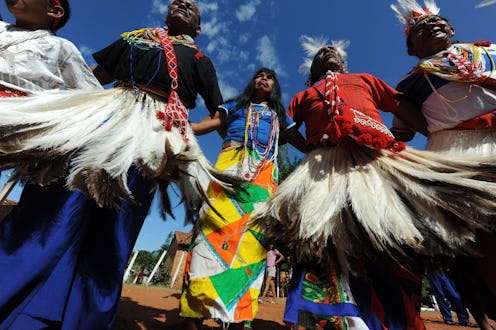Life
5 Ways To Celebrate Indigenous Peoples Day This Year
Actions to take on Monday and all year round.

One by one, cities across the United States are beginning to replace Columbus Day with Indigenous Peoples Day, an annual holiday recognizing the cultures and histories of Native people. Over the past few years, Portland, Los Angeles County, Salt Lake City, and Austin all passed resolutions to celebrate Indigenous Peoples Day on the second Monday of October, which is when Columbus Day is designated to take place. The push to celebrate Indigenous Peoples Day has intensified over the past few years, along with calls to remove statues of Christopher Columbus, but activists have been fighting to reclaim Columbus Day since the 1970s. The holiday serves as a particular reminder to celebrate Native Americans — on top of recognizing Indigenous peoples rights and cultures all year round.
Columbus Day was designated a holiday in 1934 by President Franklin Delano Roosevelt to commemorate the “discovery” of the Americas. But it’s now widely known that Columbus’ exploration of the Americas led to widespread violence against indigenous peoples. Between Columbus’ arrival in 1492 and the Pilgrims’ arrival in 1620, an estimated one-third to 90% of the Native American population died from European-borne diseases. Still today, native people across what’s now the United States, Canada, and Central and South America face discrimination directly related to the treatment of their ancestors. Celebrating Indigenous Peoples Day in lieu of Columbus Day is just a small step towards making amends for the treatment of Native people in this country, but it’s an important one.
Here are five ways you can celebrate Indigenous people on Indigenous Peoples Day.
Learn About Indigenous Cultures
Celebrate Indigenous Peoples Day by attending community celebrations, whether in-person or online, organized by Native people. Listen to Native organizers to learn about the food or music that makes these celebrations so great, and the role they play in the culture you’re observing. Indigenous Peoples Day is also a good time to learn about the tribes that live or lived where you live now. Native-land.ca is a web app that helps direct you to more resources about different Indigenous cultures and territories all over the world.
Donate To Indigenous Rights Organizations
Opening your wallet to support groups fighting for Indigenous rights is a great way to celebrate Indigenous People’s Day. Directly supporting their missions with donations allows organizations to allocate resources wherever they’re needed most. Consider donating to the Bears Ears Intertribal Coalition, a group made up of five nations who are in a battle to preserve Bears Ears National Monument in Utah, which is being threatened by the Trump administration. Or you could support Seeding Sovereignty, an Indigenous-led collective that advocates for climate justice, informed by Indigenous practices, which has been putting its efforts behind a mutual aid program during the COVID-19 pandemic.
Attend Vigils, Rallies, Or Marches Organized By Native People
After a summer of near non-stop rallies for racial justice, keep up that momentum for Indigenous-led organizations in your area. Check out what actions might be taking place locally, either online or in-person, and see what kind of solidarity is welcomed or needed. Respect organizers’ wishes for who attends, speaks, or presents at these events, too.
Support Native Artisans
Another way to open your wallet is to support Native American artists and artisans by buying their work — then proudly displaying it. Etsy is one place to connect with sellers who are indigenous, and you can also look to local artist collectives near you to see what people are making.
Don’t Just Celebrate Indigenous Peoples Day — Actively Disavow Columbus Day
That's right — it's time to have an uncomfortable conversation with your aunt about her Facebook posts. (No one's trying to "rewrite American history," Karen.) Sign petitions if your city or state has yet to recognize Indigenous Peoples Day, and don’t hesitate to talk to other non-Indigenous people about the history and legacy behind Columbus Day — and why it means we should be celebrating Indigenous Peoples Day instead.
This article was originally published on